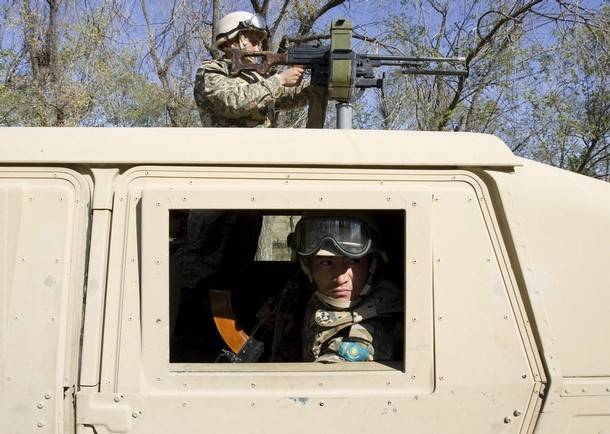
Kazakhstan Raising Its Afghanistan Profile
Publication: Eurasia Daily Monitor Volume: 6 Issue: 22
By:

On January 28 the United States announced plans to purchase a "significant part" of the goods needed to supply its forces in Afghanistan from Kazakhstan. U.S. Ambassador to Kazakhstan Richard Hoagland clarified these intentions in the context of the U.S.-Kazakh agreement on the transit of nonmilitary cargo and goods through Kazakhstan to Afghanistan. It makes more sense, however, when viewed alongside the planned increase of U.S. troops in Afghanistan; deployment of an additional 32,000 soldiers is planned for the near future (Kazakhstan Today, January 28). These forces will require new barracks, as well as extra quantities of food and medicine. Kazakhstan’s role in assisting the coalition in Afghanistan, which has been conflated with the possible provision of military assistance, appears to be growing while other nations in the region are playing an equally important logistical role.
The transit of such goods originating from Kazakhstan will raise the de facto strategic importance of Uzbekistan, since Termez will remain the key to securing overland access to Afghanistan by the northern route. Clearly, Astana is not actively pushing its neighbor into this renewed partnership with the U.S., but there are signs that a new factor is developing in how Washington conducts its diplomacy in Central Asia: "talking up" the Kazakhstan aspect, while realizing that Uzbekistan needs to be handled more consistently and carefully than in the period between September 11 and the disintegration of the strategic partnership between Washington and Tashkent in 2005.
There are contradictory signals on both sides of the bilateral relationship between the United States and Kazakhstan, but they do not diminish the growing cooperation over Afghanistan. Kazakhstan’s Ministry of Defense (MoD) has circulated a report indicating that some of the defense assistance the country receives from the U.S. will be negatively influenced by the global financial crisis. In particular, the Pentagon intends to reduce the number of Kazakh cadets attending courses within the United States. Those reductions are small and temporary, cutting back from the 30 sent to the United States in 2008 to between 20 and 25 in 2009. The MoD reacted negatively to the Pentagon’s cutbacks and was inclined to make comparisons with U.S. military cooperation elsewhere in the CIS. Would similar cuts based on the financial crisis also be made in Georgia? Or was there an underlying message or warning contained in the cuts? (Interfax-Kazakhstan, January 28).
Lieutenant Colonel James Yentz, chief of the Office of Military Cooperation at the U.S. embassy in Kazakhstan, sought to reassure the Kazakh authorities that the cuts did not suggest any downgrading of existing military cooperation plans, emphasizing that the numbers would rise again "when the crisis is overcome" (Interfax-Kazakhstan, January 28). Russia does not object to the Kazakh MoD sending cadets for courses in the United States, since the numbers being sent for military education in Russia are far higher, ensuring long-term Russian influence within Kazakhstan’s armed forces.
Kazakhstan wants to present the image that it is benefiting from U.S. military assistance, while avoiding angering its closest ally, Russia, by coming too close to adopting Western methods. Kazakhstan’s National Security Service (KNB) is in operational control of the country’s border security including the coast guard. With U.S. assistance, the KNB’s capabilities have been enhanced in the Caspian Sea. The KNB disclosed on January 23 that a regional coast guard directorate had been established in November 2008 to protect Kazakhstan’s sea borders. The regional coast guard directorate is designed to oversee the protection of the country’s economic interests in the Caspian Sea and prevent illegal migration and poaching. Military units of the directorate are stationed in Aktau (the administrative center of Western Kazakhstan Mangistau Region) and Atyrau (the administrative center of Western Kazakhstan Atyrau Region). The directorate has 9 ships and 22 motorboats (Interfax, January 23). In real terms, since the coast guard is subordinated to the KNB, the country is heavily reliant on the liaison and close cooperation between the KNB and Russia’s intelligence agencies.
Astana has utilized American assistance packages to strengthen its capability to protect the essential energy infrastructure but has never sought to lessen its close working relationship with Russia in security. Such considerations permeated the negotiations with Russia, Kazakhstan, and Uzbekistan for transit routes through which nonmilitary cargo may be delivered to Afghanistan. Within Central Asia itself, the publicity this generates tends to exaggerate Kazakhstan’s role in the formulation of logistical planning relating to Afghanistan.
No amount of U.S. defense assistance to Kazakhstan will raise fears in Moscow that the country is moving into the strategic orbit of the West, but Moscow is less certain about Tashkent’s possible future course. Washington has recently fine-tuned its diplomacy toward Central Asia, more actively allaying Russian anxieties about its interests in the region, promoting Kazakhstan as a partner in its mission in Afghanistan, and avoiding playing on tension between Tashkent and Astana. Anxieties are, however, easily triggered.




